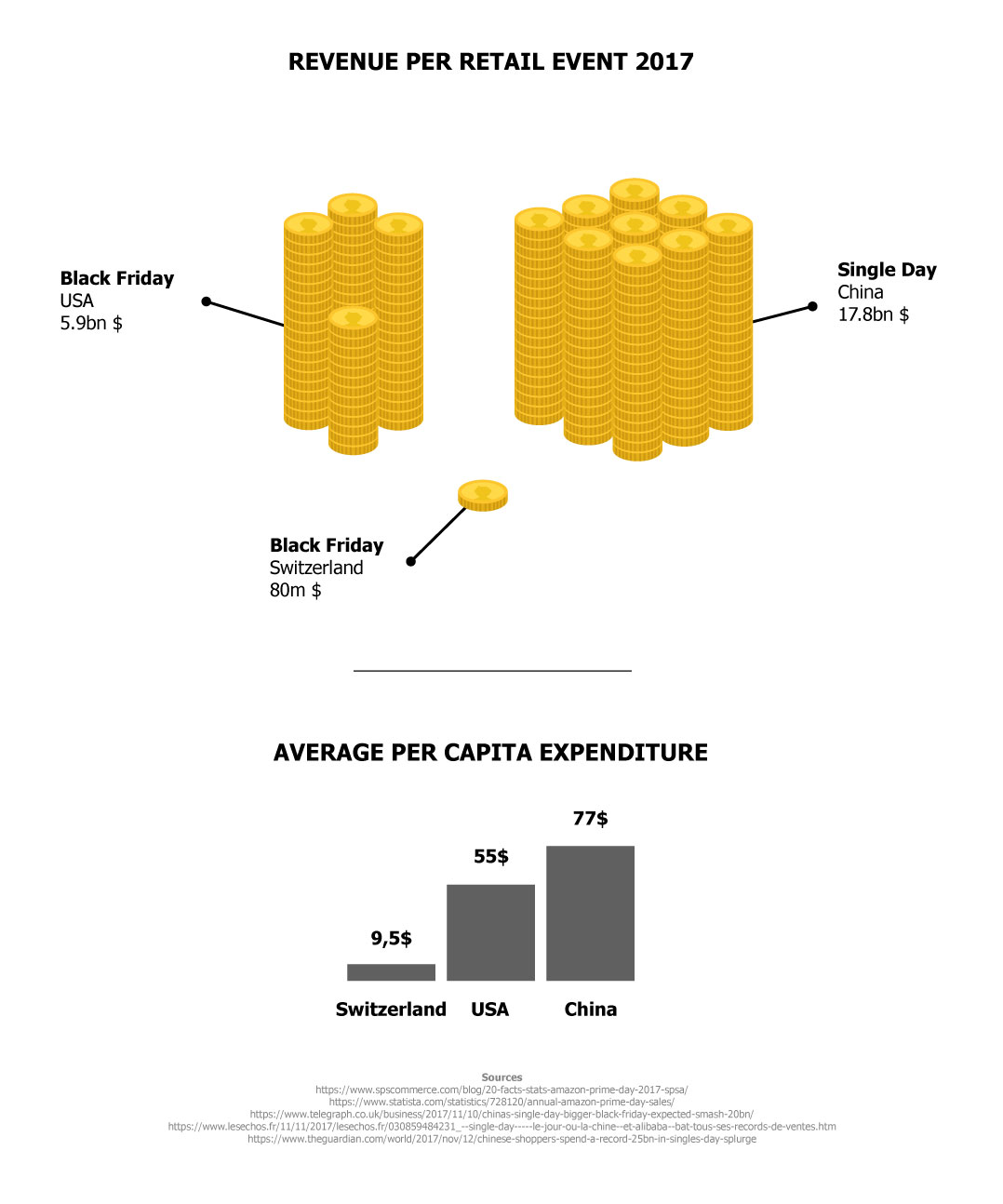
“Black Friday/Cyber Monday… marketing buzz or real opportunities for retailers and eMerchants?”
This is the title of the conference presented on Wednesday 25 April 2018 at eCom.
The speakers are:
- François Benveniste (co-founder of swiss.blackfriday)
- Jonathan Dadoun (Marketing Manager of the IKEA Centres Switzerland)
- Laurent Garet (CEO of Redoute Suisse)
- Francisco Manzano (e-Commerce Manager at Frédérique Constant, Alpina).
Black Friday (BF) is a commercial event originating from the United States and traditionally occurring the day after Thanksgiving Dinner, it is a day where retailers offer significant discounts. Black Friday has discreetly integrated Swiss consumer habits and has currently become a shopping day which is not to be missed.
Cyber Monday (CM) takes place on the Monday following BF and is some sort of “last chance”, if you happen to have missed Friday’s bargains. CM is a chance to boost sales and, above all, to make this short period of unique discounts lasts a little bit longer.
This report is a summary of the collected answers, supplemented with personal notes.
How to successfully manage a Black Friday campaign?
As a reminder and as for all other commercial actions, the keys to success are :
- incredible discounts
- an enjoyable shopping spree
- straightforward and simple transactions
Contrary to common belief, Black Friday (BF) is not an exclusively online event. The successful retailer should concentrate his efforts as much at a digital level as on the in-store shopping experience. Offline/online: the same challenge.
Regarding the online scenario, the retailer must ensure that his site is functional and able to process the massive influx of traffic. In addition to that, the user experience has to be as smooth and frictionless as possible in order to guide the users towards the checkout stage.
In physical stores, customer experience is also the key to a successful BF campaign. Beware of intimidating prices and make sure your customers associate their shopping session with a memorable experience.
Although each marketing leverage must be designed differently, the strategy must be global and the overall BF campaign, harmonious. As such, it is imperative that customers enjoy excellent service, whether behind their computer screen or in physical stores. This is a real opportunity to excel; therefore, strive to offer an experience focused exclusively on your customers’ satisfaction!
How is BF perceived and experienced compared to other sales events?
Most consumers look forward to it much more than before and take advantage of BF to do their Christmas shopping. These are almost new buyer groups, they are only active during BF, besides those who already participate in the sales of the end of the year. We observe that some purchases would probably not have been made if it were not for Black Friday.
From the consumer’s point of view
This observation is interesting, as the BF consumption pattern is different than that of traditional sales: one of the hypothesis is that traditional sales are often taken for granted, as a kind of compensation: the season is over, WE (consumers) have bought your products throughout the year, so YOU (retailers) must offer us bargains to thank us for our loyalty.
BF is more popular, less formal: consumers perceive it as a kind of reward, an authentic, no-strings-attached gift from merchants. It’s not just about compulsive shopping, it’s about having fun and deriving a certain gratification from the shopping experience.
It is interesting to note, however, that BF has a true soul in the United States and can look back on traditions which are deeply rooted in the collective spirit, as it follows the traditional Thanksgiving meal (created in 1789). In Europe, there is no such background, BF still lacks popularity, as well as a little DNA.
From the retailer’s point of view
Some retailers consider the BF season as “forced cannibalism”. In other words, they are forced to face consumer demand even if logistical, human and budgetary resources are difficult to mobilise. Although the event may seem to disrupt the Christmas shopping season, as well as the sales at the end of the year, causing an apparent loss of earnings for retailers during this period, BF compensates any such losses by generating additional revenue.
What is certain is that BF causes a budgetary impact on planning. Fully aware that the annual budgets dedicated to one-off actions are not infinite, retailers tend to focus on traditional events, as one-off actions tend to lose pace over time. It is therefore more advantageous to focus on what ensures results, to follow new trends and above all, to be ready for demand.
Will other similar phenomena appear in the retail agenda?
Presumably, as in any case, there is no evidence to the contrary. Indeed, consumers and society are changing, and we only have to take a step back to observe that the consumption patterns 30 years ago no longer work the same way in 2018.
In recent years, several new retail events have emerged, such as :
- The Single Day is experiencing an unprecedented frenzy in China. The “Singles Day” occurs on November 11 (as this date contains a sequence of “1”: 11/11) and it achieved the billion-dollar mark in two minutes during its 2017 edition.
- Amazon’s Prime Day, which was launched in 2015 to celebrate Amazon’s 20th anniversary and offers Amazon Prime customers incredible discounts.
- French Days, recently created by six French e-merchants, which, according to Wikipedia, is a “French Black Friday”.
It is important to keep in mind that not everything can be predicted and that significant changes can occur overnight. Another example that will perhaps mean more to the Swiss: The Magic Pass, which has completely disrupted the ski-pass market in Switzerland. This is why retailers need to listen to the market and adapt their offers to the market.
Is BF applicable to any sector?
Yes. Similar to Valentine’s Day, sales or Christmas, BF is a retail event that sets the pace of the year. Obviously, the best sales results occur mainly in the electronics, fashion, cosmetics and home furnishings sectors, however, based on the principle that anything can be sold, this could relate to any sector.
This is the main challenge: knowing how to take advantage of the available marketing leverage to place the right offer at the right time. Obviously, consumers are smart, they are well informed, and we should not force sales on them. As long as BF retains a positive image, any type of promotion is valid, as long as it respects the consumer.
In fact, the BF is mainly intended for the sale of products and much less for services. Over time, it will become customary to observe sports halls, museums, communication agencies or accountants participating in BF. More surprising, many craftsmen we would never imagine, also played the game: cheesemakers, butchers, chocolate makers etc.
Conclusion
Overall, BF is therefore a retail event which is perfectly suited to retailers and eMerchants, regardless of their industry. The key words for a successful BF: respect (never engage in forced sales) and a thrilling experience.
Judging by consumers’ feelings and emotional involvement, it is safe to assume that “Black Friday” will last for quite a few years to come.
Convinced? Would you like this global event to work in YOUR favour? Contact us, we would be delighted to help you promote your products/services during Black Friday.

